The Great Sahara of Morocco: Canyons of Todra Gorge, Farm on Tinghir Oasis, Amazigh Carpets and Riding Camels Over Merzouga High Erg Chebbi Dunes to Desert Camp Deep in Ocean of Orange Sand
 |
| Sahara Desert, Morocco |
Continuing our Moroccan expedition that started in Marrakech (see "Marrakech to Ouarzazate"), we have an early breakfast and check out of our Ouarzazate hotel. After visiting a farm in lush green desert oasis of Tinghir and a traditional Amazigh carpet and rug maker, we cool down a bit at one of the world's most imposing canyons of Todgha Gorge. We then pick up some legendary Moroccan dates from Erfoud before reaching Merzouga. We then ride camels over towering Erg Chebbi dunes of the Sahara to our desert camp where we are entertained with traditional music and dance around a bonfire. We sleep in tents in open desert under the stars.
Here is a complete map of our Morocco expedition. This post only covers Ouarzazate to Desert Camp leg of our Morocco trip (link to full map).
July 14, 2023
We check out of our hotel at Ouarzazate saying goodbye to two loving feral dogs that protect the property along with the guard at the guardhouse at the entrance. One of them is an Alaskan husky named "Snow". Nobody here has a clue about how Snow ended up in North Africa.
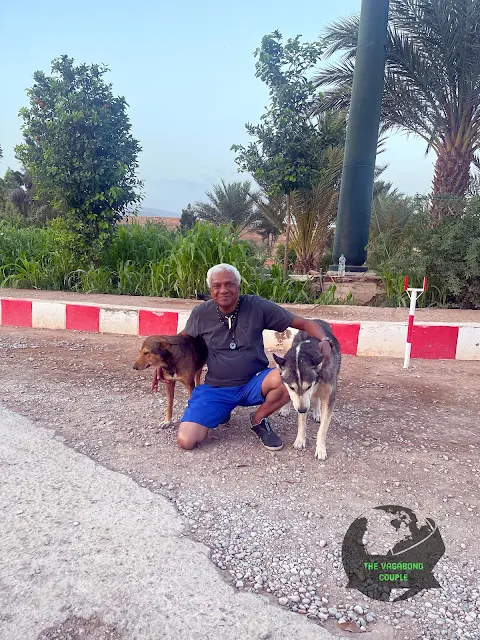 |
| Alaskan Husky "Snow" |
Tinghir Oasis & Todra Valley
We are now at the eastern foothills of the High Atlas Mountains at the edge of the Sahara ("pre-Sahara"). The Todra (Todgha) river flows in the distance, bringing water and a sudden burst of lush green and concentrated human habitat to the otherwise arid mountainous landscape, forming the Tinghir (Tinerhir) Oasis.
 |
| Vagabonds #1 and #2 with Yassine of Morocco Global Adventures at Tinghir Oasis |
The greenery in the 30-mile long oasis mainly consists of thick concentration of date palm trees around carefully maintained farm fields and plots. The ancient Amazigh people living here channel water of Oued (river) Todgha for irrigation of lush farmland below. We will soon visit such a farm next.
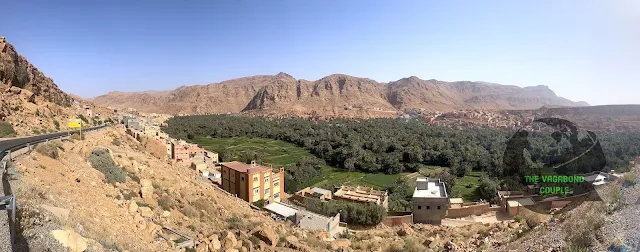 |
| Tinghir Oasis (Todra Valley) |
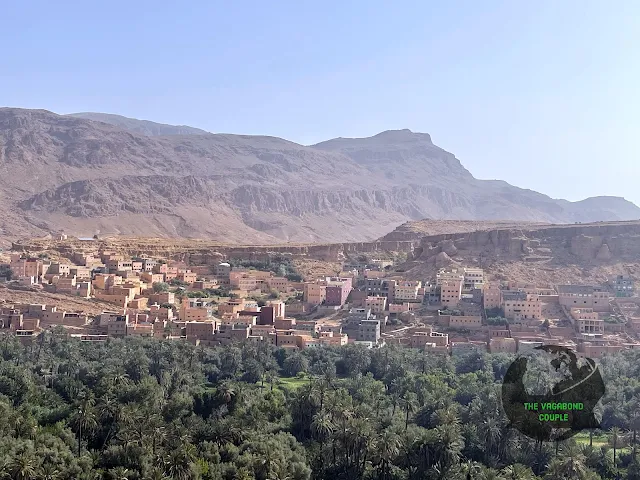 | |
|
A Farm in Tinghir Oasis
We drive down Highway N12 to the bottom of Todgha Valley and visit a farm along the Todra river (31°34'23.7"N, 5°35'07.5"W). Here is a General Introduction to the Todgha Valley.
 |
| Todgha (Todra) River flows along a farm in Todra Valley at Tinghir Oasis |
Elaborate systems of carefully designed canals channel water from Oued Todra to agricultural plots as needed.
Water is equitably distributed across the many villages along the river using an agreed upon Nouba (staggered) system. In the Nouba system, councils of village elders decide which village gets how much water.
In the Nouba system, every ighrem (village) gets full access to river water for two to four days at a time depending on the size and number of farms in the village.
The views are marvelous as we walk past along the agricultural fields and irrigation canals.
 |
| Farm crops in Todgha Valley, Tinerhir Oasis |
Oued Todra originates at Oued Tarhia. Due to the number of farms drawing water from it, Oued Todra diminishes significantly before trickling into its natural drainage in the canyons of Todra Gorge unless there are rare heavy floods. It sometimes does not flow even beyond Ait Tizgui which is south of the gorge.
 |
| Irrigation Channels |
The farmers here maintain fields of wheat, corn, barley, mint, peaches, pumpkins, almond, alfalfa grass and so on along with trees including olive and date palm.
Handmade Moroccan Berber Rugs
We enter a building adjacent to the farm. One of the houses inside is of a traditional Berber rug and carpet producer. They make rugs from scratch and sell them here. As is usual for Amazigh houses, the entrance door is marked with the iconic yaz sign.
 |
| House of Moroccan Berber rug and carpet makers |
We learn about the entire process of producing rugs, some of which is demonstrated in action. The process starts with shearing white or dark wool from sheep. Natural plant-based dyes are used to color the wool which is then spun into yarn. Silk is obtained from agave (sabra cactus) plants. The rugs are then handwoven to various patterns using the wool and the silk by manual operation of a traditional Moroccan wooden loom. This is an ancient skill. It takes months to make one well-decorated rug.
 |
| Beginning of a handmade Moroccan rug |
Todra Gorge
Watch: Todra Gorge (Todra Canyon)
We drive about 10 miles north of the farm in Todra Valley. There is a welcome sign prohibiting a lot of things in Arabic, French and Tamazight, none of which we can read. Google translate illuminates us: Do not wash cars, do not throw garbage, and do not swim in the canyon. One of the three rules does not apply to Arabic and Tamazight readers, which makes us wonder which one.
We get closer to the 1,300 foot spectacular vertical canyons (wadi) carved into red limestone by river Todgha and its mate Dades river that runs parallel to its west.
Todra Gorge is, well, gorgeous.


Todra Gorge is a hit among rock climbers. Numerous studs are hammered into the cliff faces tracing various routes to the top.
Some folks are pitching a tent right in the middle of water!
There are interesting hotels like "Kasbah Les Roches" and "Grand Restaurant Hotel Yasmina" snuggling under overhanging rocks of the cliffs. The signage appear to be crude hand-painted jobs.
 |
| Hotels at Todra Gorge |
Amazigh shepherds are herding their goats and sheep along the canyon as well. The goats seem to be exceptionally well fed and juicy.
There is a cafe and restaurant inside a cave under a rock overhang. We do not see a humorous Starbucks logo here like the one we saw at the local coffee shop at Ollantaytambo Inca Ruins.
Camel Ride over the Sahara to Desert Camp
We drive east on National Route N10 away from the foothills of the High Atlas Mountains into the Sahara Desert. Now in the Drâa-Tafilalet region of Morocco, we stop at 2:30 PM at a roadside diner just before Tinejdad for a quick bite. The rugged landscape has already started to become even more desert-like. So has the temperature.
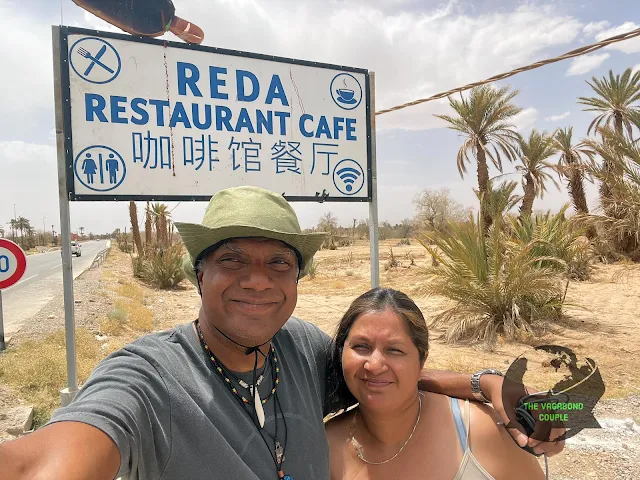 |
| Roadside restaurant on Highway N10 at Tinejdad |
We reach the traffic circle at Tinejdad and get off national highway N10 into route R702 heading southeast. Our next stop is a little souvenir shop at Ksar Touroug. Some of our travel mates buy djellaba, kaftan and scarves for headdress from here for the desert trip ahead. We already have our desert dress from Marrakech, but do buy a pair of nice camel-skin slippers.
We are also now officially in the great Sahara desert. The barren, hard rocky plateaus (hamada) that mostly make up the Sahara extends as far as our eyes can see.
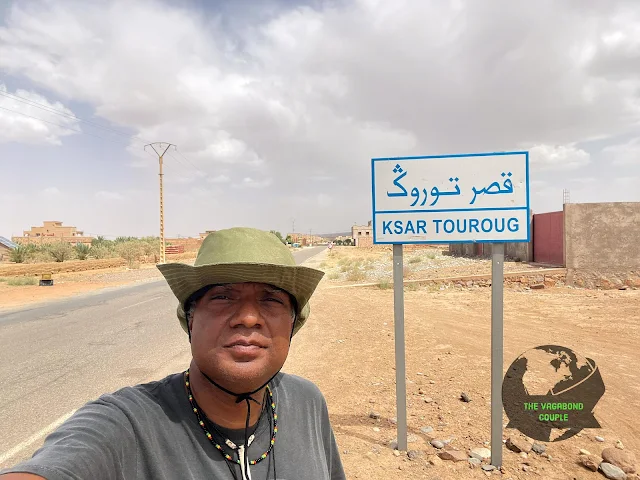 |
| Souvenir Of Sahara, Ksar Touroug, Drâa-Tafilalet |
We head farther east on highway R702 with the desert stretching to our north and east. As we approach Erfoud, there is a sudden narrow splash of greenery due to water from the Ziz river in the vicinity.
Dry canyons and spectacular eroded rock cliffs on the sides of valleys speak of a geological time long ago when powerful masses of water flowed through here.
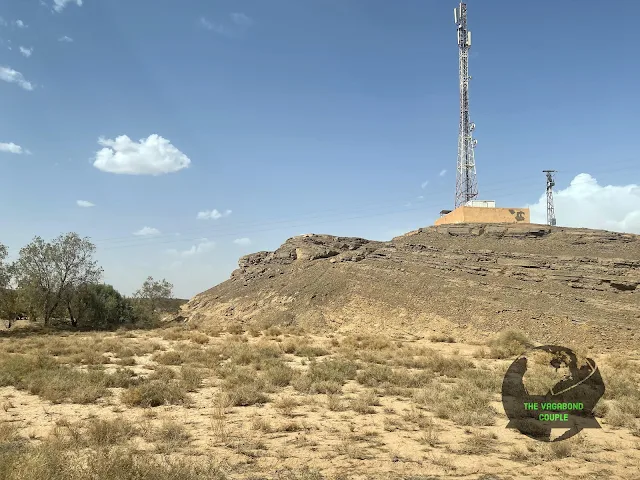 |
| Erfoud, Morocco |
We reach the desert oasis town Erfoud of the Ait Atta - people of the Atta tribe. Yassine makes a quick stop here to get us a box of famous Moroccan dates.
Of the over a hundred kinds of world-famous Moroccan dates, over 45 are special to the arid desert climate of the Drâa-Tafilalet region where date palms flourish along the oases. The "king of dates" is Medjool which are largest and the most delicious.
 |
| Moroccan Dates from Dattes Alansari, Erfoud |
We cross Oued Ziz (Ziz River) driving southeast deeper into the desert. By 5 PM we are at the edge of the iconic orange-colored mountain-sized dunes of the Sahara.
 |
| Merzouga Dunes, Sahara |
We reach Merzouga and stop at "Station Shell Dunes De Merzouga" gas station where Yassine fills up the Mercedes van and we use excellent clean restrooms. Some folks take this opportunity to put their desert dresses on.
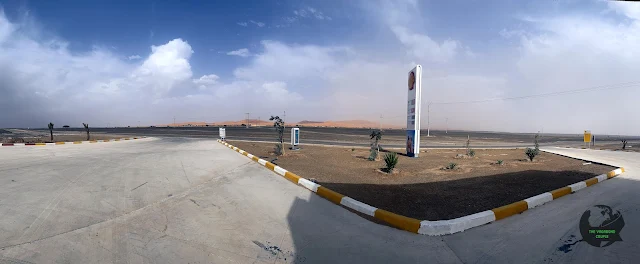 |
| Merzouga Sand Dunes viewed from gas station |
Sahara Desert Camel Ride over Merzouga Erg Chebbi Dunes to Desert Camp
The desert is simply named after the arabic word for desert: "sahara". "Erg" is arabic for "dune fields" and "chebbi" for "popular". So we will be riding camels over popular wind-blown sand dune fields of the desert.
Watch: Camel Ride over Merzouga Erg Chebbi Dunes to Sahara Desert Camp and
Singing and Dancing Around a Campfire
Route R702 merges with Azrou-Taouz National Highway N13 at Merzouga. We drive a couple of miles on N13 and exit into open desert to where a bunch of camels are waiting for us. We leave our luggage behind and get on camels. The luggage will get to our desert camp by a 4x4 automobile much before we get there.
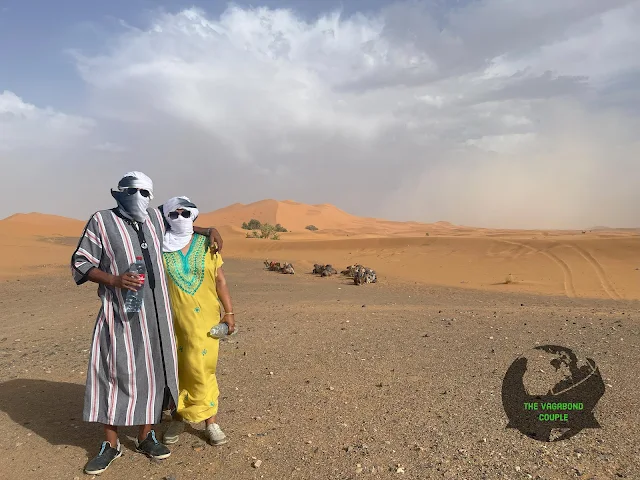 |
| Camels at Erg Chebbi Dunes, Merzouga |
And so commences one of the most memorable experiences of our life. The Erg Chebbi Sand Dunes of Merzouga are towering 500-foot high wind-blown shifting sand hills that appear orange at this time of day. They extend to the Algerian border that is very close to us.
Single-humped domesticated Dromedary Camels (Camelus dromedaries) are native to Morocco. In addition to being classic ships of the desert, they are also valued for their extremely nutritious milk and delicious meat.
The Sahara is famous for its changing colors. As the blazing sun moves overhead, the endless sand cycles trough pink, orange and purple.
The changing colors of the Sahara are due to the phenomenon in Physics called "Rayleigh scattering". Rayleigh's scattering law states that the amount of scattering of the light is inversely proportional to the fourth power of the wavelength. In layman's terms, it is sunlight interacting with dust in the atmosphere over the Sahara. The effect is similar to hues of the sky at dawn and dusk. It is also responsible for the sky turning blue during daytime.
In an unusual Moroccan tradition, folks dig themselves neck-deep into Erg Chebbi dunes in the hottest part of the year as a traditional hot sand bath (psammotherapy) treatment for rheumatism. There may be some truth to it. The American National Institutes of Health (NIH) reports, "however, very limited evidence suggests that hot sand baths might be useful in improving symptoms and functionality of patients with some rheumatic and respiratory chronic illnesses."
Camels are perfectly adapted to the desert. Thorns of scarce desert shrubs and cactus are no match for their thick lips. They can completely close their noses during sand storms, and they have extra padding on their chests and knees to be able to sit down and relax on burning hot sand. They can also sleep standing up!
 |
| Sahara Desert Camel Ride, Erg Chebbi Dunes, Merzouga |
It is 7 PM by the time we reach our camp on the edge of a dune. Moroccan law prohibits campsites within dunes.
Our camels are beautiful loving animals who like to be scratched on the little tuft of hair on their heads, sometimes nudging us to demand to be scratched more.
 |
| Sahara Desert Camp, Erg Chebbi Dunes, Merzouga |
Given the surrounding desertscape, our camp is a beautifully decorated oasis of luxury. Our tent is huge with a queen and a twin bed spread out at two ends with a high ceiling. There is even a writing desk and a chair!
There are multiple clean bathrooms with showers and hot water. At night, electric lighting all through the camp is powered by batteries charged by photovoltaic systems (solar panels) during the day. They push out enough additional power for charging cell phones and laptops for those unfortunate enough to be unable to disconnect from their tech gadgets.
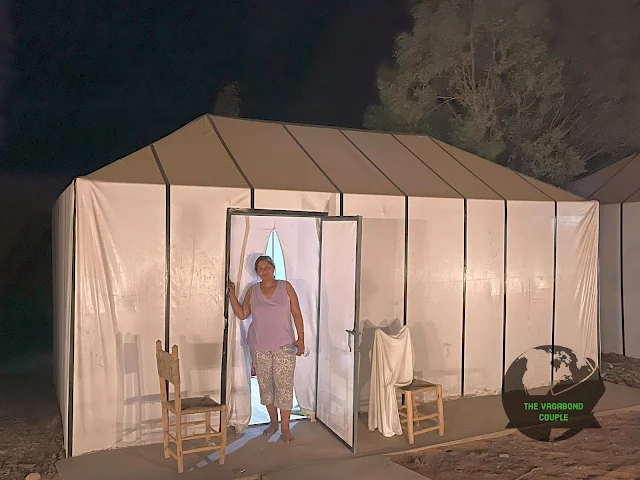 |
| Sahara Desert Camp, Erg Chebbi Dunes, Merzouga, Morocco |
Dinner is cooked and served in a big tent. Afterwards, a bonfire is lit. Songs and dance under a crystal clear desert night sky make for an experience that is indescribable (watch the video above).
Then there is pin drop silence in the Sahara. Nothing moves except a random whiff of wind. The desert cools down rapidly as we draw our blankets up and drift into blissful sleep.
We will ride camels back to civilization the next morning and get on a desert road to the historic silk-road city of Fes. That is our next story told at "Morocco: Merzouga to Fes Desert Road over High & Middle Atlas Mountain Ranges via Ziz Valley, Al-Hassan Addakhil Lake, Zaabal Tunnel, Enzala Mosque, Midelt, Boulajoul, Monkey Park & Ifrane".


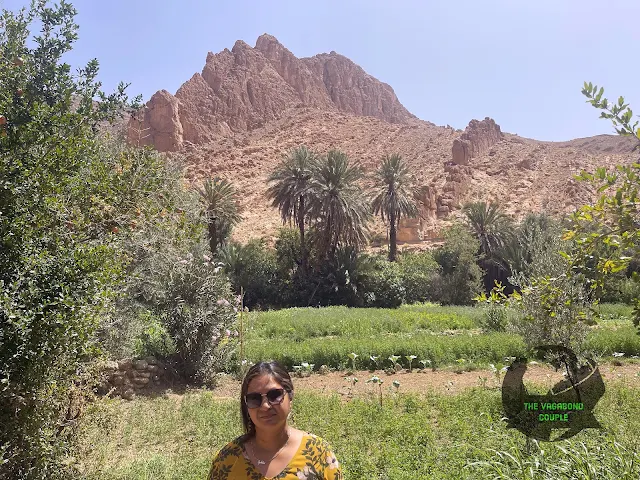
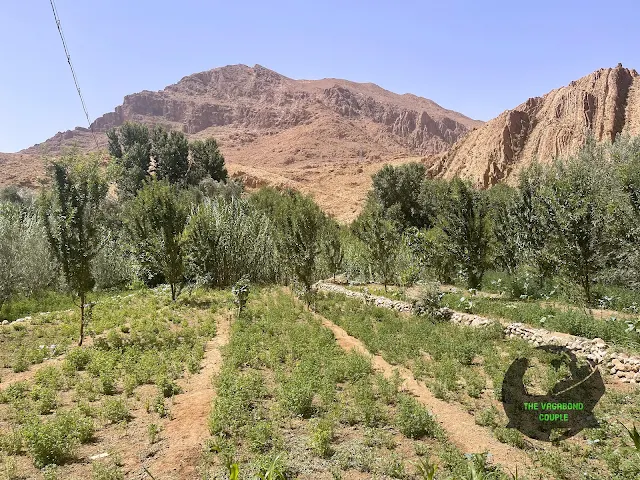
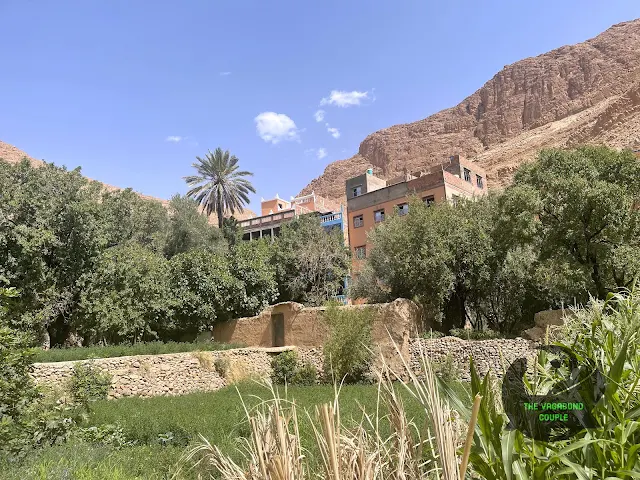
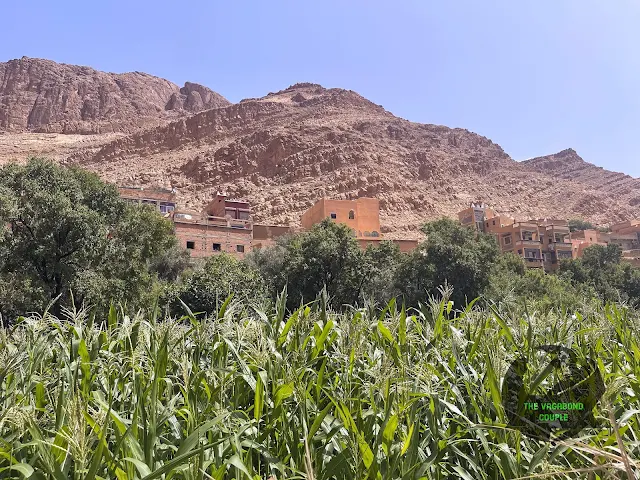


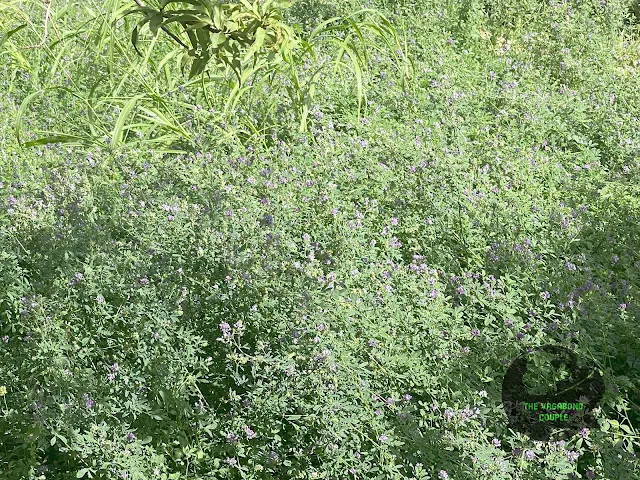

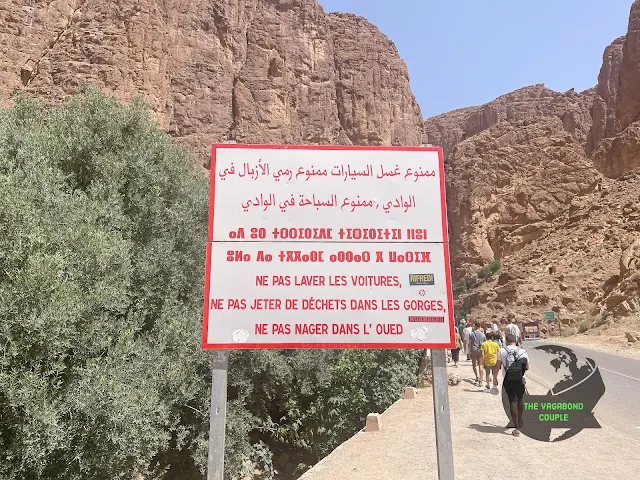


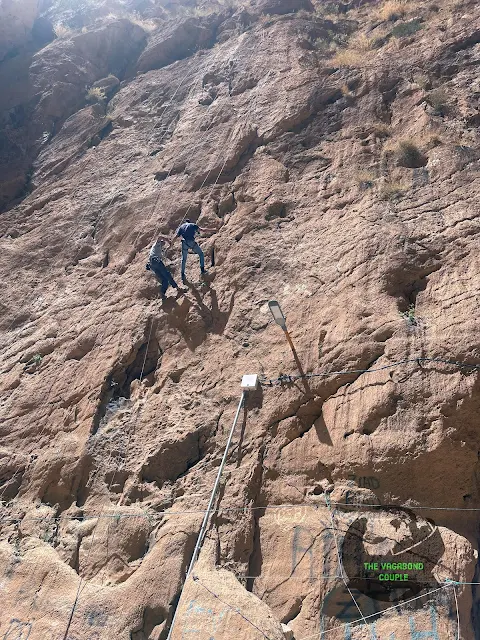
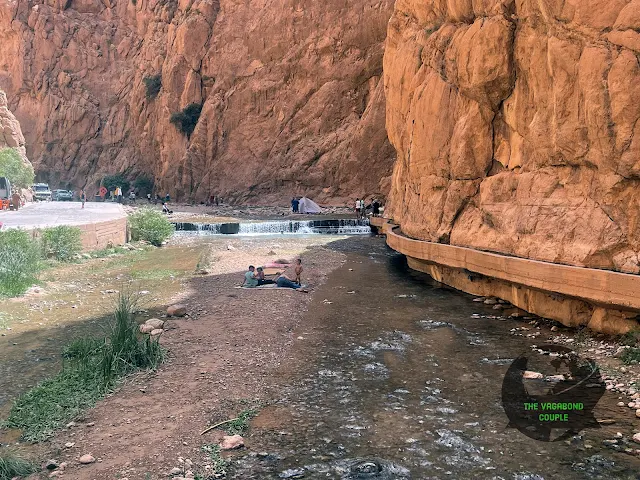


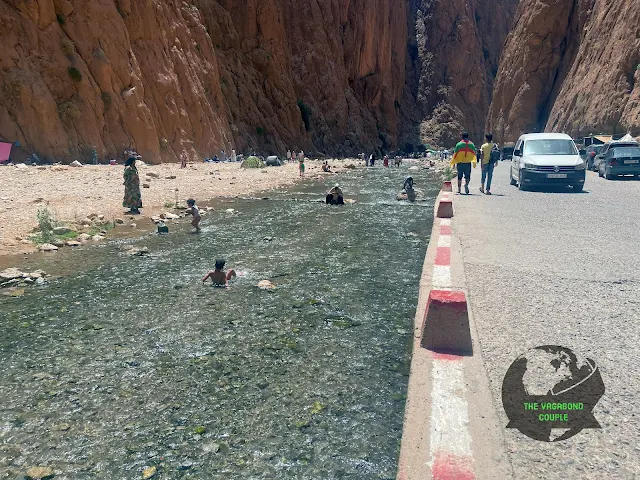

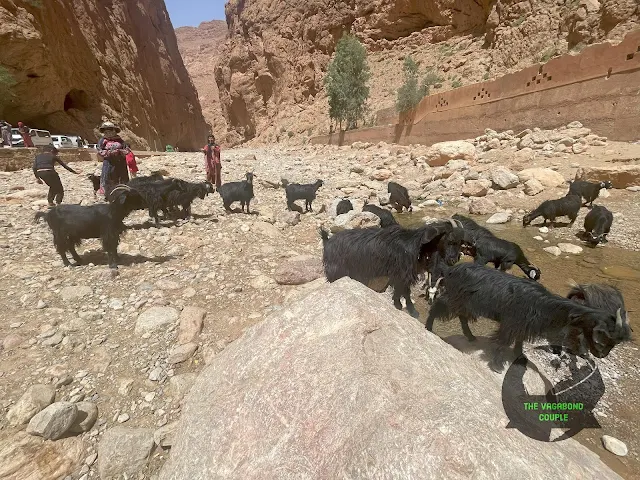
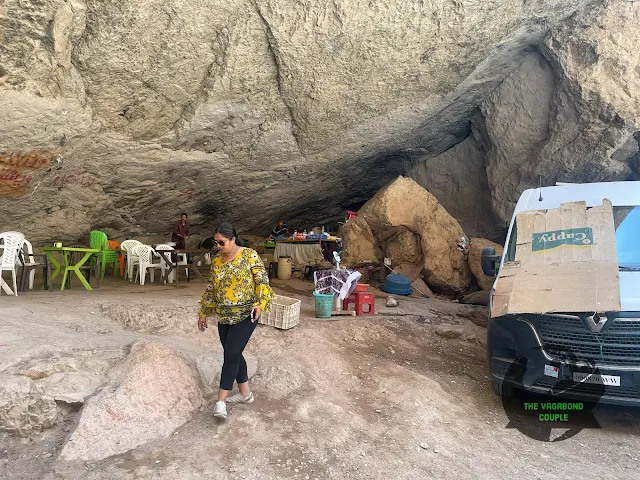

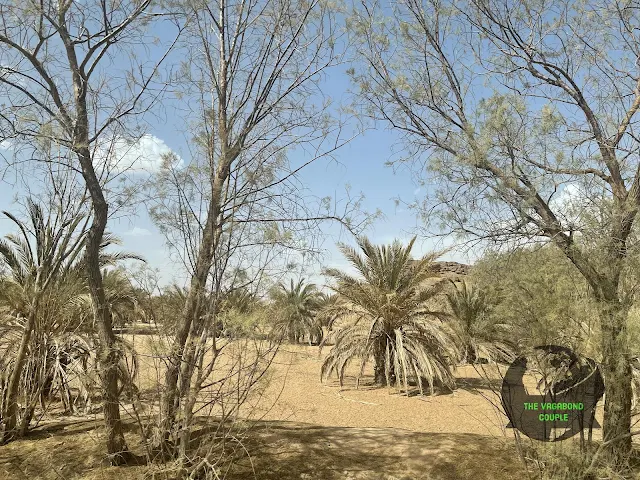
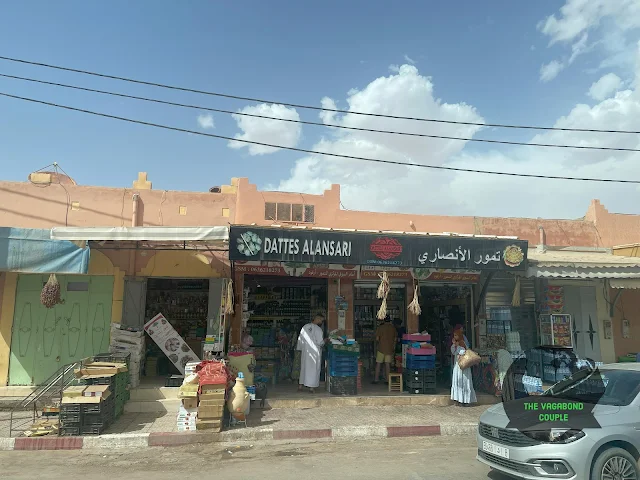


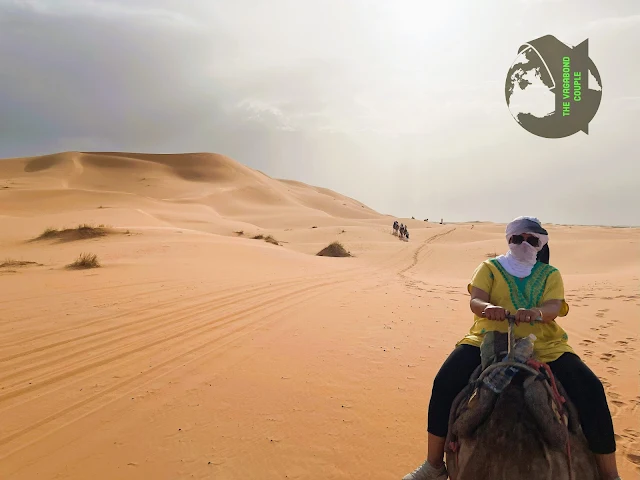
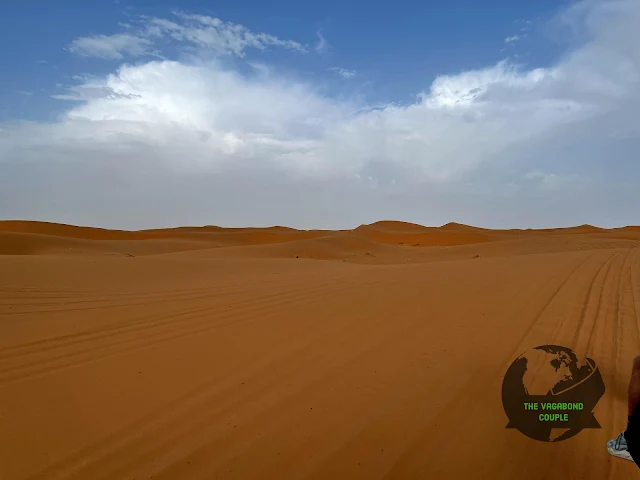
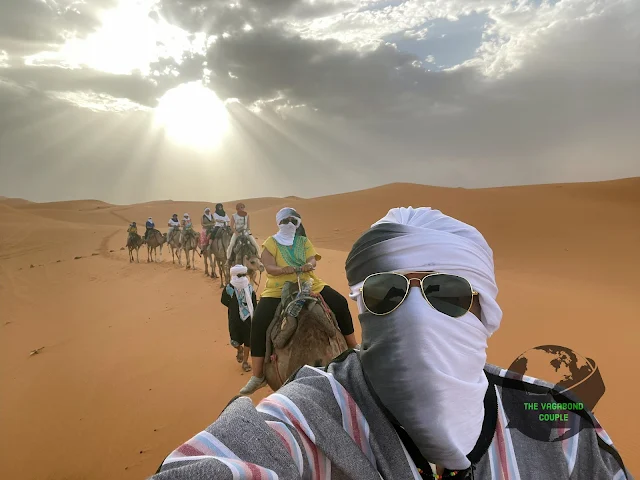

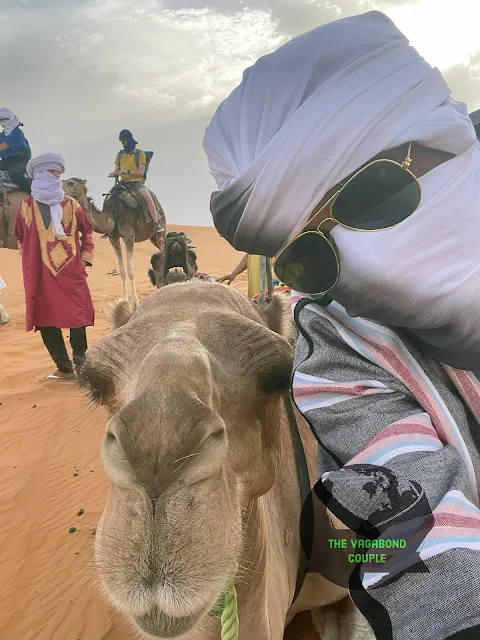

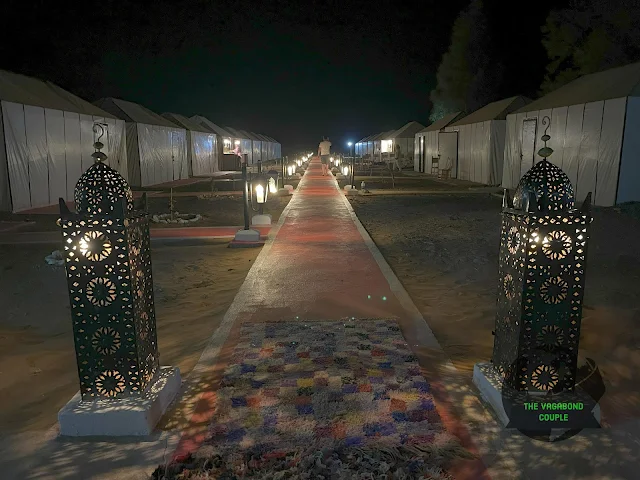

0 comments